Sahara Onward
|
May 1,
1999
|
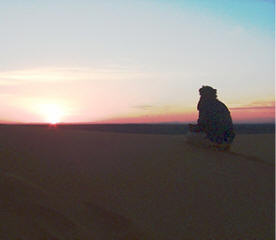
The
Sheltering Sky
Ron writes:
 Out of Africa I'm in my room in
Sevilla, Spain. I spent the morning walking in this peaceful city checking out the
Teatro de la Maestranza trying to buy tickets to the Opera El Cid featuring Placido
Domingo. I listened to a violinist in the street playing the haunting melody of La
Paloma and sat by the tranquil river watching the boats float by. No one
offered to show me a mosque or sell me a rug. So it's in that context, sitting here
thinking about the harsh Sahara desert and Morocco, a country without a symphonic
orchestra, that I conclude, if Europe is a fine suit of clothes, Morocco is a hair
shirt. I'm sure I read somewhere that Joan of Arc, Thomas More and Ernest Hemingway
all visited Morocco the week before giving up their lives. Out of Africa I'm in my room in
Sevilla, Spain. I spent the morning walking in this peaceful city checking out the
Teatro de la Maestranza trying to buy tickets to the Opera El Cid featuring Placido
Domingo. I listened to a violinist in the street playing the haunting melody of La
Paloma and sat by the tranquil river watching the boats float by. No one
offered to show me a mosque or sell me a rug. So it's in that context, sitting here
thinking about the harsh Sahara desert and Morocco, a country without a symphonic
orchestra, that I conclude, if Europe is a fine suit of clothes, Morocco is a hair
shirt. I'm sure I read somewhere that Joan of Arc, Thomas More and Ernest Hemingway
all visited Morocco the week before giving up their lives.
It's not that I hated Morocco, I may go back someday because I
left with vivid memories and experiences I've never had and places we didn't visit. But
Morocco forces you pay attention to it and compels to work at it, constantly, and I am
drained from the encounter. You notice the stomach growls as a potential sign of
trouble limiting the distance you're willing to travel from the safe harbor of your own
clean toilette. And having a green salad with tomatoes, olive oil and vinegar is a
forbidden pleasure. And then there are all of the people wanting to help you,
putting you on guard, thereby missing a close encounter of the good kind (which we had
several of), or dropping your guard and having their friendly charm lead to a close
encounter of the worst kind, buying a rug (more on this later).
I'm convinced it was appropriate that we visited Morocco when we did
relative to our six month Ramble. It was God's test to see whether we had
the mettle to last the entire six months or were we puny American Tourists unable to cope
with the rigors of travel. I keep having these flashbacks to scenes in the Sheltering
Sky where Kat nurses her husband who eventually dies of typhoid in the middle of
nowhere and she ends up in some ksour playing kissie face with the local sheik. It
sounds romantic, but it didn't happen to us and we are looking forward to next five months
richer for the experience.
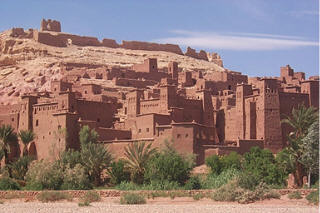 Our first day out
of Marrakech we crossed the high Atlas Mountains with our driver Mohammed I firmly in
control of his Mercedes and Susan and I in the back seat anticipating our entry into
the Sahara desert. Susan was so happy I wasn't driving (I think she overreacts when
I power slide into the supermarket parking lot). Our first Kodak moment occurred at
Ait Benhaddou (above,) an incredibly beautiful kasbah. It was used as a backdrop in
Lawrence of Arabia and, more recently, in Jewel of the Nile. It took me a very long
time from this narrow vantage point to get a shot without tourists in the way and the
group trying to take pictures behind me was having the same problem. Our first day out
of Marrakech we crossed the high Atlas Mountains with our driver Mohammed I firmly in
control of his Mercedes and Susan and I in the back seat anticipating our entry into
the Sahara desert. Susan was so happy I wasn't driving (I think she overreacts when
I power slide into the supermarket parking lot). Our first Kodak moment occurred at
Ait Benhaddou (above,) an incredibly beautiful kasbah. It was used as a backdrop in
Lawrence of Arabia and, more recently, in Jewel of the Nile. It took me a very long
time from this narrow vantage point to get a shot without tourists in the way and the
group trying to take pictures behind me was having the same problem.
These kasbahs and surrounding oases appeared throughout this fertile
valley. Our travel guide indicates that there were frequent disputes over territory
and water rights. A quote from historian Walter Harris "Their whole life was
one of warfare and gloom. Every tribe had its enemies, every family had its blood
feud, and every man his would- be murderer" reminds me that the Moors invaded and
impregnated Sicily in an ancient time and that was how they came to film The Godfather.
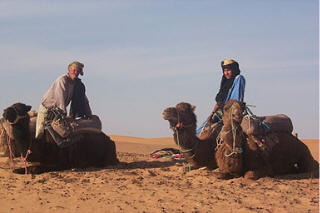 Our second day out we arrived in Erfoud,
35km from the great sand dunes in Merzouga and hired Mohammed II to drive us into the
desert in his Land Rover. We took Mohammed I with us so he could interpret.
Getting to Merzouga in the daylight is a matter of simply following the telephone poles
across the open desert until you see two heavy camel operators. There are no signs
and no roads, only little piles of rocks and electric wires stretching to Timbuktu.
Looking into the distance and watching the sand dunes come into view was a little like the
first time I saw snow driving from Florida to Pennsylvania as a kid. Our second day out we arrived in Erfoud,
35km from the great sand dunes in Merzouga and hired Mohammed II to drive us into the
desert in his Land Rover. We took Mohammed I with us so he could interpret.
Getting to Merzouga in the daylight is a matter of simply following the telephone poles
across the open desert until you see two heavy camel operators. There are no signs
and no roads, only little piles of rocks and electric wires stretching to Timbuktu.
Looking into the distance and watching the sand dunes come into view was a little like the
first time I saw snow driving from Florida to Pennsylvania as a kid.
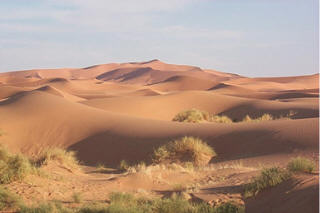 They were
everything I had imagined and everything I had remembered from the countless movies I've
seen of men walking in circles across endless miles of sand piles or French soldiers
fighting the Moroccans or Peter O'Toole's blue eyes sparkling in the desert sun. So
we hired Mohammed III (I see a pattern emerging) to guide us to the highest point we could
see. I couldn't believe it, but as we trudged up from one side of the dune, two
young men, one German and the other British, trudged up from the other side and we bumped
into each other at the very top. With apologies to Mel Brooks, the conversation went
something like this: They were
everything I had imagined and everything I had remembered from the countless movies I've
seen of men walking in circles across endless miles of sand piles or French soldiers
fighting the Moroccans or Peter O'Toole's blue eyes sparkling in the desert sun. So
we hired Mohammed III (I see a pattern emerging) to guide us to the highest point we could
see. I couldn't believe it, but as we trudged up from one side of the dune, two
young men, one German and the other British, trudged up from the other side and we bumped
into each other at the very top. With apologies to Mel Brooks, the conversation went
something like this:
Ron:
"Hello. We didn't see you, where did you come from?"
German: "We're camping on the other side of
this dune in those tents you see down there."
Brit:
"Where are you staying? We're quite ready for a hot shower."
Susan: "Have you been
following this Kosovo thing and what do you think is going to happen to the Euro when the
UK joins the EU. And do you think that it's fair how the Moroccans treat their
women?"
Ron: "We're
staying at a nice place in Erfoud. Great shower. Costs about $90"
Mohammed III: "I guide you there by
camel, no problem. We have mint tea right here to seal the deal. Only 10
dirhams."
Susan: "I read in the Herald
Tribune that British Telecom is planning a joint venture with Hoesch-Rhone which should
create one of the largest monopolies in western Europe."
German: "You give me name of
hotel."
Brit:
"By jove, this Mohammed chap is a bloody bore!"
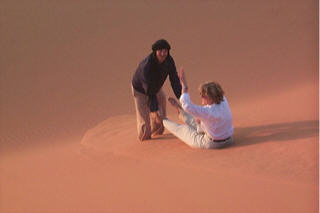 Ron:
"Its the Erfoud Inn. Call us when
you get in. We'll have lunch." Ron:
"Its the Erfoud Inn. Call us when
you get in. We'll have lunch."
(Mohammed III drags Susan off into the dunes as she shouts "May all
the camels of your ancestors return and caca in your tennis shoes")
We left our new friends and walked across the seams in the sand dunes
leaving footprints that would be gone in the morning. We joined all of the
Mohammeds at the Marzouga Cafe and had mint tea before the trek back to Erfoud. Half
way back, we stopped to watch the stars emerge into a perfectly black sky. Susan
noticed the big dipper so I began explaining to these Bedouins who have been roaming the
deserts for centuries, how to locate Polaris, the North Star. There we were the four
of us in a tight circle, me pointing to Polaris, all gazing at the night sky, Susan
interpreting into French, no one for miles around, and a phone rings, I swear!
Mohammed reaches into his coat pocket (he always wore this blue blazer but I hadn't
noticed the bulge before) and pulls out his cell phone. I'm not sure, but I think it
was his wife wanting to know if he was going to be late for dinner. I heard him say
things like "Americani", "I know it's late", "I realize this is
the third time this week, but he's showing me how to find the North Star", "The
wife wants to know if you are a liberated women", "Yes, I'll pick up some
cous-cous on the way home".
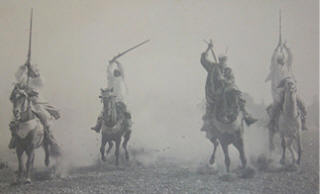 I won't bore you with the details, but we
hired another guide in Rassini, Mohammed IV (I'm not making this up) to take us through
several kasbahs. We found out how serious these Mohammeds are when the last one
tricked us into a rug shop and and hour later we left abruptly, two rugs under our
arms, having outbargained their best salesman. Shooting over my shoulder, I managed
to get a photo of the four Mohammeds chasing us as we fled Morocco for
Spain...........Ah Espana! where the women are good looking, the men are all proud,
and the tourists are above average! I won't bore you with the details, but we
hired another guide in Rassini, Mohammed IV (I'm not making this up) to take us through
several kasbahs. We found out how serious these Mohammeds are when the last one
tricked us into a rug shop and and hour later we left abruptly, two rugs under our
arms, having outbargained their best salesman. Shooting over my shoulder, I managed
to get a photo of the four Mohammeds chasing us as we fled Morocco for
Spain...........Ah Espana! where the women are good looking, the men are all proud,
and the tourists are above average!
Susan writes:
I always feel like the Dean Martin to Ron’s Jerry Lewis. I'm always the straight
(wo)man. Where does he get that stuff?
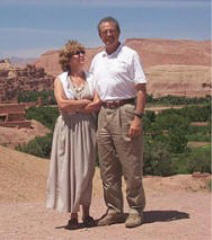 When
we finally stepped back on to Spanish soil I felt two things: surprised that we actually
made it out of Morocco with no mishap and not much the worse for wear, and a strong desire
for a couple of days in white space to think about it. You can’t think about Morocco
while you’re in Morocco, you’re too busy staying alert, watching out for
incoming "guides" or food that's going to kill you. And I didn’t want to
jump right back into the cacophony of Spain without saying my personal good-byes to that
strange and difficult country. So, a couple of days in Seville doing nothing more than
paying a visit to the Barber of Seville for a terrific haircut and laying about, not even
consulting the guide books, trying to process our Morocco experience. Wherever it ends up
packed in my suitcase of memories, it’s sure to inform the rest of the trip, When
we finally stepped back on to Spanish soil I felt two things: surprised that we actually
made it out of Morocco with no mishap and not much the worse for wear, and a strong desire
for a couple of days in white space to think about it. You can’t think about Morocco
while you’re in Morocco, you’re too busy staying alert, watching out for
incoming "guides" or food that's going to kill you. And I didn’t want to
jump right back into the cacophony of Spain without saying my personal good-byes to that
strange and difficult country. So, a couple of days in Seville doing nothing more than
paying a visit to the Barber of Seville for a terrific haircut and laying about, not even
consulting the guide books, trying to process our Morocco experience. Wherever it ends up
packed in my suitcase of memories, it’s sure to inform the rest of the trip,
After pondering, I decided that we were fortunate in our visit: we didn’t suffer
infestations or grimy sheets or rotted food or holdups at knife point…all stories we
heard. I left with prickly heat rash, a rumbling stomach, and exhaustion from the four
a.m. prayer calls, but intact. We met some travelers in the Port of Tangiers while waiting
for the ferry to Spain, who weren’t as fortunate as we, since they were a bit more
exposed to the elements of Morocco. A young American couple, Will and Kristin, using
buses, trains and hostels, travling light, and a Canadian backpacker, Brett. We had a few
hilarious hours on the boat crossing the Strait of Gibralter swapping stories and
guide-avoidance techniques. Poor Brett had only spent a few days in Morocco, in Tangiers
and Casablanca, and was held up at knifepoint twice and was fleeing, glad to be leaving
Africa. He’d also been charged by a rhino in the jungle somewhere; guess he had a bad
week. Casa, as those in the know call Casablanca, and Tangiers, are not the most
hospitable of Moroccan cities. Will and Kristin had somewhat better experiences but were
also glad to be departing, Kristin couldn’t  forgive
the Muslims their treatment of women and their xenophobia, after all, what’s the good
of all those mosques if only Muslims can go in? and what is best way to deal with the
stand up turkish toilets and no toilet paper? Do the veils and draperies encage the women
or liberate them? Will was a savvy traveler, even spoke Arabic, but was happy to be
able to quit worrying about Kristin’s well being and comfort, since they had stayed
in some dicey places and women travelers are targets, escorted or not. Will is a geek and
Ron got to show off his bag of hacker goodies. Finally, a kindred soul who understood
techno-babble and was duly impressed by my husband’s toys. They were so sweet and fun
and full of adventure. We didn’t tell them of our cosseted travels, in a big bad
Mercedes with a Mohammed to protect us. Actually, except for the petit taxis which are
some sort of tiny cars made of egg cartons and tinker toy parts, Mercedes are the only
cars you see there. They are called Grand Taxis. forgive
the Muslims their treatment of women and their xenophobia, after all, what’s the good
of all those mosques if only Muslims can go in? and what is best way to deal with the
stand up turkish toilets and no toilet paper? Do the veils and draperies encage the women
or liberate them? Will was a savvy traveler, even spoke Arabic, but was happy to be
able to quit worrying about Kristin’s well being and comfort, since they had stayed
in some dicey places and women travelers are targets, escorted or not. Will is a geek and
Ron got to show off his bag of hacker goodies. Finally, a kindred soul who understood
techno-babble and was duly impressed by my husband’s toys. They were so sweet and fun
and full of adventure. We didn’t tell them of our cosseted travels, in a big bad
Mercedes with a Mohammed to protect us. Actually, except for the petit taxis which are
some sort of tiny cars made of egg cartons and tinker toy parts, Mercedes are the only
cars you see there. They are called Grand Taxis.
The people we met along the way were the highlights of our visit. I especially remember
Samil, a young man educated in France now working with his father in the construction
business, who said "If you have eyes and a heart, it is difficult to live in this
country." He told us that among the educated no one likes the King, (although we had
heard the opposite from the villagers) because it appears that the King’s interest is
in keeping the people miserable and hungry. If they have full bellies, shelter, a job,
some peace of mind, they will look up from their backbreaking labor and see that the
government is not serving them. As long as they are busy struggling for the next loaf of
bread and a shelter from the elements, they won’t concern themselves with anything
else. Our driver in the desert also worried aloud about the consequences of all the new
schools: "What will we do with all these children after they are educated? There will
be a revolution!" Better to keep them uneducated and ignorant. And beyond the
Imperial cities of Marrakech, Fes and Rabat, in the harsh desert, is where a lot of these
people are, still living and working as they have for centuries. Using the same tools, the
same architecture, the same irrigation systems, growing the same crops. Time, and any sort
of technological evolution, stopped long ago.
Still, I was powerfully impressed by our experiences in the desert. Climbing the
Saharan dune was something I have long wanted to do, and being in that vast and historic
desert was thrilling. It was more- and less- than I expected, as all of Morocco proved to
be. It is more populated and exploited than I expected, it is also more diverse
geographically. It has long black mountains and red buttes. It has red-gold dunes and vast
plains of scrub. It has settlements of clay villages, called ksours, and it has lonely
black tents of Bedouin families moving mysteriously around, living here or there for
a few months and then disappearing. We saw them in the desert and in the mountains. And it
has the huge, lush, fabulous oases that are the source of all life and most myth of the
desert communities. These palmeries are long plantations that follow the desert rivers and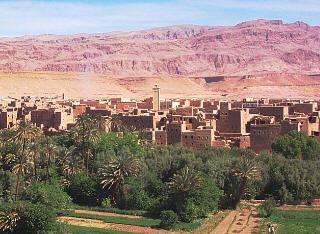 provide food and trade for the villages that are built above and around
them. Rarely will you see a village inside of an oases because they are far too valuable
as agriculture to despoil by houses. Date palms, nut and fruit trees, wheat and clover,
corn and vegetables are all planted in small ancestral family plots that are guarded
carefully, often fought over. You will be driving through what seems like a huge flat
endless plain of scrub and sand and desolation and then suddenly drop into a vast hidden
gorge at the bottom of which lies one of these oases, like a great green river flowing
through the arid canyon. provide food and trade for the villages that are built above and around
them. Rarely will you see a village inside of an oases because they are far too valuable
as agriculture to despoil by houses. Date palms, nut and fruit trees, wheat and clover,
corn and vegetables are all planted in small ancestral family plots that are guarded
carefully, often fought over. You will be driving through what seems like a huge flat
endless plain of scrub and sand and desolation and then suddenly drop into a vast hidden
gorge at the bottom of which lies one of these oases, like a great green river flowing
through the arid canyon.
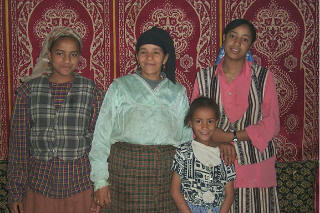 There is still terrible poverty among the people who live in this area. Not
all the oases are rich. And not all the people live in the ones that are. In Rassini,
there has been 15 years of drought and two locusts plagues. Biblical stuff. Killed off the
oases with desertification. But the King is right, the people still seem happy not knowing
anything but their small hard lives. The children are pure delight and beautiful with
bright, knowing eyes, full of sly intelligence. We visited one of the ksours with yet
another Mohammed (the fourth? fifth?) and wandered the tiny packed-dirt alleys and visited
the home of a family: two rooms, one open to the sky for living and one with platforms
covered in rugs for sleeping. One piece of furniture, a sort of china cabinet with a few
family treasures. And a small TV set. They don’t have running water or indoor
plumbing, but they get a few local TV channels for entertainment. There is still terrible poverty among the people who live in this area. Not
all the oases are rich. And not all the people live in the ones that are. In Rassini,
there has been 15 years of drought and two locusts plagues. Biblical stuff. Killed off the
oases with desertification. But the King is right, the people still seem happy not knowing
anything but their small hard lives. The children are pure delight and beautiful with
bright, knowing eyes, full of sly intelligence. We visited one of the ksours with yet
another Mohammed (the fourth? fifth?) and wandered the tiny packed-dirt alleys and visited
the home of a family: two rooms, one open to the sky for living and one with platforms
covered in rugs for sleeping. One piece of furniture, a sort of china cabinet with a few
family treasures. And a small TV set. They don’t have running water or indoor
plumbing, but they get a few local TV channels for entertainment.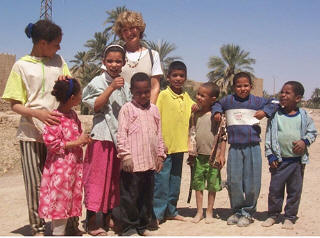 Seems a bit skewed to me, mass hypnosis. However, they were very proud of their home and
stood for a photograph for us, tickled to death when Ron showed them the picture on the
camera. We also saw the one source of water, a well with a leather bag, that was used by
the donkeys as well as the villagers. We left, trailed by some of the children (there were
300 children who lived in this village) who wanted to hold my hands, touch my clothes,
talk to me. Ron was scary to them, too tall, his hands too large.
Seems a bit skewed to me, mass hypnosis. However, they were very proud of their home and
stood for a photograph for us, tickled to death when Ron showed them the picture on the
camera. We also saw the one source of water, a well with a leather bag, that was used by
the donkeys as well as the villagers. We left, trailed by some of the children (there were
300 children who lived in this village) who wanted to hold my hands, touch my clothes,
talk to me. Ron was scary to them, too tall, his hands too large.
To revel some more in the contrasts and contradictions of Morocco we drove on to Fes,
out of the desert, through the searingly beautiful Middle Atlas mountains and checked into
a new, beautiful hotel, the Jnan Palace and one day for lunch we dined alone in a palace,
and the charming young maitre d’, another college-educated young man with no
prospects of a job, gave us a grand tour that included the apartments of the owner's wives
(4) and the roof terrace with a view of the sprawling city. The food was wonderful and the
maitre d’ turned out to also be the entertainment and played the lute for us and sang
strange Arabic songs of longing for Andalusia, the fabled Spanish land that was lost when
the Christian kings of Castile conducted their "ethnic cleansing" back in the 13th
century and expelled the Moors who had been living in, and ruling, Spain for 600 years. 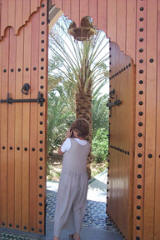 We
paid one more visit to the souks, with one more guide. We admired one more mosque
and one more palace, each from the door again. Peering into the doors, not allowed
in; that's how Morocco is to the visitor. Always a surface, either luxurious or
impoverished, always sadly beautiful, and always mysterious and just beyond reach. We
paid one more visit to the souks, with one more guide. We admired one more mosque
and one more palace, each from the door again. Peering into the doors, not allowed
in; that's how Morocco is to the visitor. Always a surface, either luxurious or
impoverished, always sadly beautiful, and always mysterious and just beyond reach.
So. Now we are back in Spain. And last night we battled through the tourist
ghetto to the flamenco where we sat with three American girls who had sailed to Tangiers,
in shorts, and turned around and left three hours later. I’m really glad we were
forewarned, that we were able to be cosseted and escorted, that we listened to the friends
who had been and who said, if you can afford it, go first class, it will make all the
difference. And it did. I thought traveling that way would keep us too removed, out of
touch, but I was wrong. Like the country, it was another contradiction: the more protected
we were the more we were able to see and experience.
|